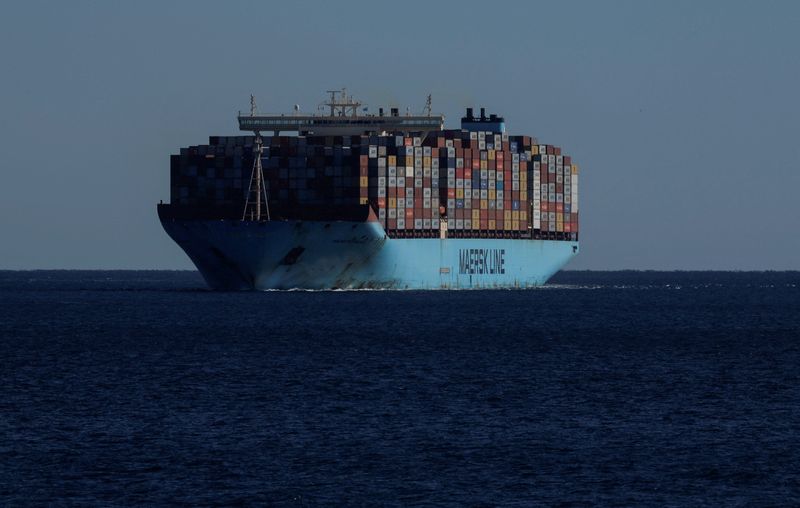LONDON (Reuters) -Two measures of corporate and economic health were flashing red on Friday as shipping group Maersk reported a fall in global demand for sea containers and advertising giant WPP (LON:WPP) said clients in the U.S. tech sector were slashing their marketing spend.
A.P. Moller-Maersk lowered its estimate for global container trade this year as companies reduce inventories and higher interest rates and recession risks in Europe and the United States drag on global economic growth.
The company, one of the world's biggest container shippers, said it expects container volumes to fall by as much as 4%. It had previously forecast a decline of no more than 2.5%.
Maersk controls about one-sixth of global container trade, transporting goods for retailers and consumer companies such as Walmart (NYSE:WMT), Nike (NYSE:NKE) and Unilever (LON:ULVR).
WPP, the world's largest advertising group, warned that U.S. tech clients had pulled back spending in the second quarter, which Chief Executive Mark Read said took the company by surprise.
"Spend will pick up after a period of time, but I think we are nervous for the rest of the year because we can't get total clarity on when that's going to happen," he told Reuters.
The retreat in spending led WPP to follow rival Interpublic - which last month also blamed tech clients cutting marketing budgets - in lowering its growth forecast for this year, to 1.5-3.0% from 3-5%.
That was a stark contrast from February, when WPP, which owns the Ogilvy, Grey and GroupM agencies, reckoned clients would spend on marketing through any downturn to prop up sales and justify price rises.
Analysts said the news reflected caution among companies wrestling with higher borrowing costs and consumers tightening their own budgets amid a cost of living crisis.
Marketing spending is often the first to get cut when companies are worried about a strain on cash.
WAIT AND SEE
"Corporations are in wait-and-see mode when it comes to splashing the cash and handing margin over, at a time when demand is very tough to profile," said Sophie Lund-Yates, lead equity analyst at Hargreaves Lansdown (LON:HRGV).
Apple (NASDAQ:AAPL) on Thursday warned that its sales would decline for the fourth quarter in a row, although Amazon.com Inc (NASDAQ:AMZN) was more upbeat, reporting sales growth and profit that beat Wall Street's expectations.
The signs of economic turbulence will underscore concerns that a bounce in China's economic activity after Beijing lifted its long COVID lockdowns will prove short-lived. Companies had bet that a Chinese rebound would help offset the impact from slowdowns in the U.S. and European economies.
The scope of stimulus Beijing has offered to revive the economy so far has underwhelmed the market.
Global firms from consumer goods giant Unilever to automaker Nissan and machinery maker Caterpillar (NYSE:CAT) have warned of slowing earnings there as the world's second-largest economy loses its post-pandemic spring.
Expectations for second-quarter earnings were already low due in part to China's weakness. Refinitiv I/B/E/S data show European companies are expected to report their worst quarterly results in years. U.S. results have been better than expected, but as of Friday were still posting a 4.2% year-over-year drop in second-quarter earnings, mostly due to the energy sector.
The International Monetary Fund last week said that it expects global economic growth to slow this year, led by advanced economies even as food prices have come down and the March banking turmoil has been contained.
It expects the global growth to slow to 3% this year and next, from 3.5% last year.

Echoing Maersk, DHL Group, among the world's biggest shippers, said on Tuesday it saw drops of 16% and 7.1% respectively in air and ocean freight volumes in the first half, particularly on routes between China and its two biggest trading partners, the United States and Europe.
"I don't know that we've ever seen freight demand fall this far so fast and for so long without an accompanying economic recession," logistics firm Knight-Swift chief David Jackson said in a post-earnings call last month.